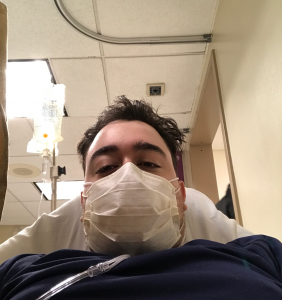
Lying on a hospital bed covered in a white sheet, vented with an IV on his right hand, Pete Salazar was alone in the room. He stared at the white ceiling and let his memory rewind to his eighth-grade prom with his girlfriend at the time, Paula. It was the day when they officially started dating.
Salazar, a 22-year-old senior majoring in English at Hunter College, dated Paula for nine years. It’s been three years since they’ve spoken, but Paula was the name that lingered on Salazar’s lips when he was fighting against the coronavirus. “I wanted to get some stuff out of my chest–say my goodbyes,” said Salazar.
Salazar was diagnosed with COVID-19, which has killed nearly 300,000 people worldwide. After four days of experiencing symptoms which he thought to be flu, he rushed to Elmhurst Hospital in Queens where he battled for his life and survived.
Salazar went to the hospital on March 22 where he waited with his family for nearly five hours to get admitted. “I had to argue with one of the nurses because he was just admitting people based on the way they looked–if you look young, he wasn’t letting you in,” said Salazar.
The week at Elmhurst became a nightmare for Salazar. Along with the usual symptoms of the coronavirus like fever, chills, chest pain and shortness of breath, he threw up every couple of hours. Doctors and nurses came and went daily, checking his vital signs with no signs of improvements. He spent sleepless nights with no one in the room to hold his hand. The thought of dying alone and not waking up crossed Salazar’s mind countlessly.
Elmhurst Hospital, the center of the epicenter is located in one of the poorest and diverse areas in NYC. Health officials have described the hospital as overrun, overwhelmed and crying out for help. On the week Salazar got admitted, the hospital was operating at 125% capacity, with dozens more people lined up outside seeking tests and treatment.
At home, Salazar’s family suffered with him. He rarely had the energy to call. “The nurses were kind enough to charge my phone and I only talked to them—limited,” said Salazar. His parents spent most of their time praying and hoping that their son would make it out alive. “It’s really sad, as a father, to know that someone in your family is going to die,” said Angel Salazar.
After a week, Salazar transferred to Forest Hills Hospital where he had to wait on a stretcher in the emergency room for a day to get admitted because of the overcrowding. That’s the point where he thought he wouldn’t make it. After getting a room, lying in a bed he watched his heart rate on the monitor go up, almost double, “Fifty more palpitation and I would have died,” said Salazar who recalls silently tearing up in pain.
On the first day of April, he felt better. The symptoms were almost gone, and he could eat and breathe on his own. He Facetimed his parents, got back to all the other people who left him messages. “I was feeling terrific,” said Salazar who went to bed hoping he would go home the next day.
However, as if he got April fooled, his symptoms returned the very next day. “I woke up and I was back to where I was two days ago,” said Salazar. Afraid of not surviving another day, Salazar wanted to get some closure with people he lost touch with, especially Paula. So, the little energy he left in his body, Salazar asked his friend to to text Paula for him. Then he reconsidered: “No, wait.” Salazar told his friend. Instead, he asked him to contact her after he was died. “I just felt like that would have been powerful if I had died—my last impression,” said Salazar.
Two days later, he started getting better. Back home on April 6, he sat in front of his laptop from his parent’s apartment and shared his experience with his classmates via Zoom. “I was very happy when you came back,” Angel said to his son in Spanish. “The days you were in the hospital, I didn’t sleep, I didn’t eat.” His mother couldn’t hold up her tears when he came home. “I thanked God for bringing my son back alive,” said Gladis S. Alvarez. “I wanted to hug him, but I couldn’t.”
Salazar was out of danger and on the road to recovery. He maintained isolation within the four walls of his bedroom for another 14 days. In the meantime, he started catching up with his classes and missed assignments. Even with the cancellation of commencement, he is excited about graduating by the end of the semester, as he is the first one to finish college from his family.
After experiencing nearly two deaths and surviving through it, he now sees things differently. “I am happy—can’t keep being sad and keep thinking about the day I almost died,” said Salazar. Although he never contacted Paula after the recovery, he still walks today with “the precious memory” of her locked inside his heart.

